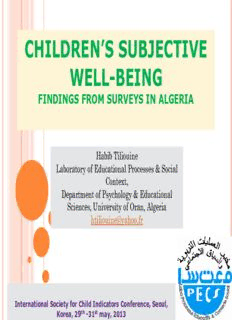
Children's Subjective Well-Being Findings from Surveys in Algeria PDF
Preview Children's Subjective Well-Being Findings from Surveys in Algeria
CHILDREN’S SUBJECTIVE WELL-BEING FINDINGS FROM SURVEYS IN ALGERIA Habib Tiliouine Laboratory of Educational Processes & Social Context, Department of Psychology & Educational Sciences, University of Oran, Algeria [email protected] International Society for Child Indicators Conference, Seoul, Korea, 29th -31st may, 2013 C A THE OUNTRY OF LGERIA North African Country 10th largest in the world and largest in Africa ( ) more than 2 million sq. klms 37.9 million inhabitants (Jan., 2013) Mostly Arab and Muslim country Painful shift from a single party system of governance to political pluralism in 1989 –10 years civil war, ended in 2002- Since 1976, education is free at all levels ( ) and compulsory until the age University included of 16. ABOUT 70% ARE LESS THAN 35 YEARS OLD Some achievements… Between 1980 and 2011, Algeria’s mean years of schooling and also expected years of schooling increased by 5.3 years. The population with at least secondary school level for females was 36.3 %, and its equivalent for males 39 was 49.3 % in 2011. About 9 million people are at schools and universities, i.e., about one fourth of the total Algerian population. This size puts a lot of pressure on the country’s budget goBveertwnmeeenn t1 9b8u0d gaentd. 2012 Algeria's HDI rose by 2.0% annually from 0.461 to 0.713 today, which gives the country a rank of 93 out of 187 countries with comparable data. SOME WELL-BEING THEORY … Well-being is defined as perceptions, evaluations and aspirations of the people (Campbell, Converse and Rodgers, 1976) It represents better the subjective components of Quality of Life and could be considered as an important social indicator Well-Being of adults as well as youth inform us on the Quality of Life of the people Studying Well-being allows us to understand the social dynamics and social changes taking place in any social context, to reinforce wise governance and well founded social policies …YET, the study with youth remains itself young and its social and political relevance is often missing, mainly in developing societies. OUR WELL-BEING RESEARCH …. Started in 2003 studying the concept with adults in large surveys on an 18-month interval basis (up to 2012, 7 surveys completed, N>18,300 studied subjects) In 2011 started work on children’s well-being Main aims with children: Understand the concept of well-being of youth compared to adults Test the usefulness of some international measures in the Algerian context Explore variations in well-being Monitor changes in children’s well-being over time THREE WELL-BEING SURVEYS WITH YOUTH… 2011: Compared students of successful and less successful secondary schools 2012: Compared Spanish and Algerian Middle and Secondary school students 2013: A large pilot study as part of Children’s Worlds International Study of Children Well- Being (ISCWB) 2011 SURVEY: COMPARING SUCCESSFUL AND LESS SUCCESSFUL SEC. SCHOOLS Period: May 2011, the region of Oran, a Mediterranean coastal area. Sample: 638 students (266 males from less successful schools. One to two classes were randomly selected from the schools’ samples. Gender is equally represented in both groups. Mean Age in the successful one was 18.61 (SD 0.96) and 18.77 (SD 1.01) in the less successful (p = 0.04). Methodology: Questionnaire with PWI at the top. The schools’ sample (N =24) was chosen on the basis of the rate of success in the National baccalaureate exam (>70 % Vesus <50 %) from the years 2005 to 2011. All subjects of study variably represented. The questionnaires administered during normal teaching hours. Personal Wellbeing Index: Cronbach alpha=(0.78). all item-total correlations and domain intercorrelations were significant at a high level- FA one factor solution with high loadings Standard of living, then achievements in life and religiosity are the main contributors in the general satisfaction with life in young students in their final sec. sch. Year. IN COMPARISON WITH ADULTS: 2011 SURVEY Students rate higher all aspects of PWI compared to adult population. Youth’s SWB is strong compared to older adults. In congruence with previous research (Casas et al., 2012, Tomyn & Cummins, 2010). This universal trend of SWB maybe attributed to better health not yet facing problems of employment and adults’ life pressures. BUT the results failed to detect differences between Successful and less successful sec. schools in their WB scores. CONCLUSIONS FROM 2011 SURVEY … Good PWI psychometrics All WB cpomparisons are in favour of young students compared to adults Decline in well-being with age Slightly higher satisfaction with Future security (p=.03) in favour of females Rating of satisfaction with Spirituality and Islamic Religiosity is strong But, no variations in WB when successful and less successful schools are compared using PWI, but objective measures did.
Description: